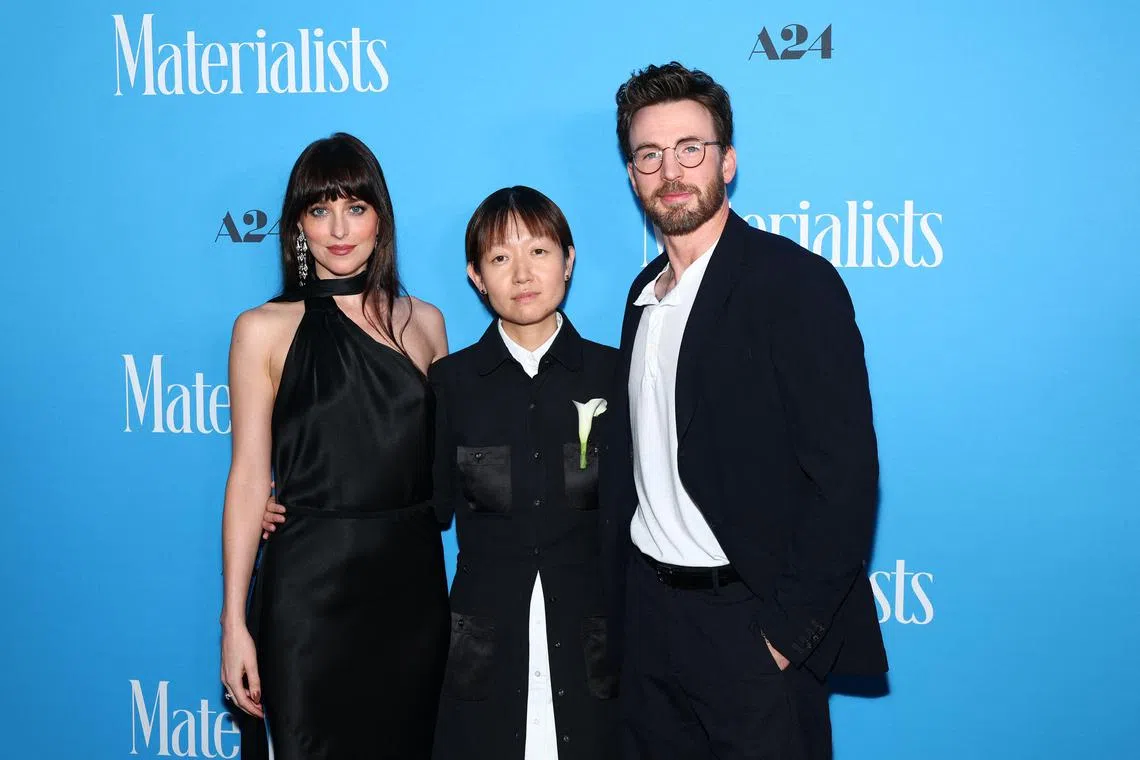‘Love has no numbers’: Celine Song, director of Materialists and Past Lives, is a die-hard romantic
Sign up now: Get ST's newsletters delivered to your inbox

(From left) Dakota Johnson, Celine Song and Chris Evans at the Materialists premiere in New York City on June 7.
PHOTO: AFP
Follow topic:
LOS ANGELES – Film-maker Celine Song has no time for negativity – or practicalities – when it comes to love.
The Korean-Canadian writer-director is known for Past Lives (2023), a romantic drama that was nominated for Best Picture and Best Original Screenplay Oscars, and enjoyed an 18-month run at local indie cinema The Projector ending in March.
Opening in Singapore cinemas on Aug 28, her second film, Materialists, stars American actress Dakota Johnson as a New York matchmaker determined to stay single herself unless she can find a wealthy husband.
But she finds herself torn between a millionaire (Pedro Pascal) and her former boyfriend, a waiter struggling to make ends meet (Chris Evans).
Chatting to The Straits Times over Zoom, Song is asked whether these films – which celebrate the lightning-in-a-bottle aspect of love – cultivate a hyper-romanticised ideal that might leave viewers a little disappointed when it comes to dating in real life.
“Why do you just assume they’re going to be disappointed?” says the 36-year-old, gently chiding this reporter. “That’s so sad.
“And not necessarily. You could also find love.”
Song – who is married to 35-year-old Justin Kuritzkes, the American screenwriter behind Challengers (2024), the sexually charged tennis drama starring American actress Zendaya – also feels like the dating market is overly focused on material practicalities, such as what potential partners earn and how old they are.

Justin Kuritzkes (left) and Celine Song at the Tribeca Festival Artists Dinner in New York City on June 9.
PHOTO: REUTERS
“We seem very obsessed with these numbers,” says Song, who modelled Johnson’s character after her own experience working at a high-end matchmaking agency in New York for six months a decade ago.
“I didn’t do it for very long, but the thing I walked away with the most is how, when you ask everybody about the person they want to date, they’ll say the height, weight, income and age – they’ll give you a bunch of numbers.
“But I also knew that dating was supposed to be in pursuit of love, and love has no numbers, because love is unconditional. It’s about ‘in sickness and in health’.
“You still have to be able to love that person when they lose their job.”
Song – who was born in South Korea before moving to Canada with her film-maker father and illustrator mother at age 12 – is asked if she thinks Asian societies, where people can be more open about valuing income and other material factors when it comes to dating, might view things differently.
“That’s interesting. I don’t know.
“We all have a different way that we’re contending with the global marketplace and the finance side of our society, and maybe some of the language and comfort around talking about things more financially is connected to the way our societies are formed.”
Song’s romantic ideals are also somewhat challenged by the fact that traditional cultures still practising arranged marriage – for instance, in India – often report lower rates of divorce.
But she does not think the 40 to 50 per cent divorce rate reported in much of Europe and North America is that bad.
“You could talk about that like, ‘I can’t believe that 50 per cent of them fail’. But you can also be like, ‘no, but 50 per cent of them succeed – it’s a miracle’.”
And she carves out an exception for Asian societies, where “it’s so much more about the community and the family, even a marriage”.
“So, you don’t have to get everything just from your marriage – you have a whole community of people that you live with,” Song says.
“If your partner is driving you crazy, you have, like, 10 friends or community members you can hang out with until you stop being annoyed.
“That’s probably part of the reason families are also more involved in these decisions, too. The family members are saying, ‘I need to approve them because they’re going to be a part of our family’. In America, that’s not necessarily true,” she says.
Online dating and dating apps are touted by many as helping with the “numbers game” aspect of modern relationships. But here, Song is, once again, a die-hard romantic.

Dakota Johnson (left) and Pedro Pascal in Materialists.
PHOTO: SONY PICTURES
“Love is such a great miracle and it’s a total lightning strike when it happens.
“Dating apps are a way to go out into the field when there is a thunderstorm and hold out forks to get struck by lightning.
“So, I think the apps can increase the chance of that if you use them correctly. It’s a way to help the random strike.”
Materialists opens in Singapore cinemas on Aug 28.

